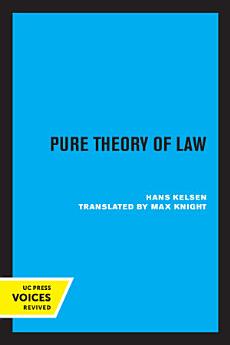Pure Theory of Law
มี.ค. 2024 · Univ of California Press
eBook
366
หน้า
family_home
มีสิทธิ์
info
reportคะแนนและรีวิวไม่ได้รับการตรวจสอบยืนยัน ดูข้อมูลเพิ่มเติม
เกี่ยวกับ eBook เล่มนี้
Pure Theory of Law defines law as a system of coercive norms created by the state that rests on the validity of a generally accepted Grundnorm, or basic norm, such as the supremacy of the Constitution. Entirely self-supporting, it rejects any concept derived from metaphysics, politics, ethics, sociology, or the natural sciences. Beginning with the medieval reception of Roman law, traditional jurisprudence has maintained a dual system of "subjective" law (the rights of a person) and "objective" law (the system of norms). Throughout history this dualism has been a useful tool for putting the law in the service of politics, especially by rulers or dominant political parties. The pure theory of law destroys this dualism by replacing it with a unitary system of objective positive law that is insulated from political manipulation.
This title is part of UC Press's Voices Revived program, which commemorates University of California Press's mission to seek out and cultivate the brightest minds and give them voice, reach, and impact. Drawing on a backlist dating to 1893, Voices Revived makes high-quality, peer-reviewed scholarship accessible once again using print-on-demand technology. This title was originally published in 1967.
Pure Theory of Law defines law as a system of coercive norms created by the state that rests on the validity of a generally accepted Grundnorm, or basic norm, such as the supremacy of the Constitution. Entirely self-supporting, it rejects any concept deri
This title is part of UC Press's Voices Revived program, which commemorates University of California Press's mission to seek out and cultivate the brightest minds and give them voice, reach, and impact. Drawing on a backlist dating to 1893, Voices Revived makes high-quality, peer-reviewed scholarship accessible once again using print-on-demand technology. This title was originally published in 1967.
Pure Theory of Law defines law as a system of coercive norms created by the state that rests on the validity of a generally accepted Grundnorm, or basic norm, such as the supremacy of the Constitution. Entirely self-supporting, it rejects any concept deri
เกี่ยวกับผู้แต่ง
Kelsen Hans : Enter the Author Bio(s) here.
ให้คะแนน eBook นี้
แสดงความเห็นของคุณให้เรารับรู้
ข้อมูลในการอ่าน
สมาร์ทโฟนและแท็บเล็ต
ติดตั้งแอป Google Play Books สำหรับ Android และ iPad/iPhone แอปจะซิงค์โดยอัตโนมัติกับบัญชีของคุณ และช่วยให้คุณอ่านแบบออนไลน์หรือออฟไลน์ได้ทุกที่
แล็ปท็อปและคอมพิวเตอร์
คุณฟังหนังสือเสียงที่ซื้อจาก Google Play โดยใช้เว็บเบราว์เซอร์ในคอมพิวเตอร์ได้
eReader และอุปกรณ์อื่นๆ
หากต้องการอ่านบนอุปกรณ์ e-ink เช่น Kobo eReader คุณจะต้องดาวน์โหลดและโอนไฟล์ไปยังอุปกรณ์ของคุณ โปรดทำตามวิธีการอย่างละเอียดในศูนย์ช่วยเหลือเพื่อโอนไฟล์ไปยัง eReader ที่รองรับ







